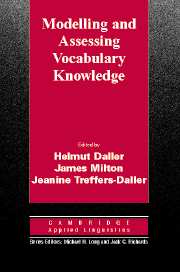Book contents
- Frontmatter
- Contents
- List of contributors
- List of abbreviations
- Acknowledgements
- Foreword
- Series Editors' Preface
- Editors' introduction
- I Fundamental issues
- II Vocabulary and learner differences
- III The unit of assessment and multiple vocabulary measures
- Chapter 4 Validity and threats to the validity of vocabulary measurement
- Chapter 5 Comparing measures of lexical richness
- Chapter 6 Productive vocabulary tests and the search for concurrent validity
- Chapter 7 Exploring measures of vocabulary richness in semi-spontaneous French speech
- Chapter 8 Lexical richness and the oral proficiency of Chinese EFL students
- IV Metaphors and measures in vocabulary knowledge
- V Vocabulary measures in use
- References
- Appendices
- Index
Chapter 6 - Productive vocabulary tests and the search for concurrent validity
Published online by Cambridge University Press: 04 May 2010
- Frontmatter
- Contents
- List of contributors
- List of abbreviations
- Acknowledgements
- Foreword
- Series Editors' Preface
- Editors' introduction
- I Fundamental issues
- II Vocabulary and learner differences
- III The unit of assessment and multiple vocabulary measures
- Chapter 4 Validity and threats to the validity of vocabulary measurement
- Chapter 5 Comparing measures of lexical richness
- Chapter 6 Productive vocabulary tests and the search for concurrent validity
- Chapter 7 Exploring measures of vocabulary richness in semi-spontaneous French speech
- Chapter 8 Lexical richness and the oral proficiency of Chinese EFL students
- IV Metaphors and measures in vocabulary knowledge
- V Vocabulary measures in use
- References
- Appendices
- Index
Summary
Introduction
The question this chapter raises is whether it is always possible to collect useful validity information for new vocabulary tests which claim to target specific aspects of knowledge. The difficulties entailed in collecting such information may help explain why some tests emerge into general use before such data is available. The quest for objective measuring tools which can quantify lexical knowledge has spawned a plethora of L2 vocabulary tests. Several of these are mentioned elsewhere in this volume, for example the Vocabulary Levels Test (Nation, 1983), the Lexical Frequency Profile (Laufer and Nation, 1995), P-Lex (Meara and Bell, 2001), X-Lex (Meara and Milton, 2003b), and various applications of Type-Token Ratios (TTR) (for example Arnaud, 1984; Laufer, 1991). The practical nature of tests such as these – they tend to be relatively quick to administer and mark, and produce a numerical score – makes them extremely attractive to EFL teachers who are often required to assess the proficiency or progress of large numbers of students. As a consequence of this, we often see tests being used to make judgements about the language level of non-native speakers and/or about the lexical richness of a text (see the concerns of van Hout and Vermeer (Chapter 5), this volume) before we have conclusive proof that the tests themselves produce reliable and valid results.
- Type
- Chapter
- Information
- Modelling and Assessing Vocabulary Knowledge , pp. 116 - 132Publisher: Cambridge University PressPrint publication year: 2007
- 12
- Cited by

